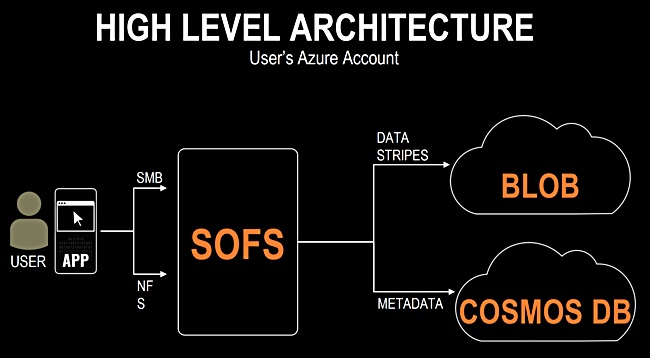Scality is developing a scale-out file system (SOFS) for Microsoft Azure Blob storage.
The company is building a cloud-native scale-out file system in the Azure Cloud using Microsoft Azure Cosmos DB to store file system metadata and file data payloads stored as objects in the Azure Blob service.
Paul Speciale, Scality chief product officer, told a press briefing in London last week that “Microsoft does not have a big fat file system in Azure” for unstructured data.
He said Azure Blob is designed for large amounts of unstructured object data, not files. Scality’s idea is to offer file services to hold large volumes of unstructured file data on Azure Blob storage as a lower-cost, high-capacity file storage tier.
According to Scality such a file system must support:
- Thousands of clients in a scale-out fashion,
- Deliver a minimum of 350MB/sec on single file transfers,
- Support SMB and be Blob API-compatible,
- Run in a customer’s cloud subscription,
- Object storage economics.
Scality RING has scale-out file system capability and Scality is already familiar with Azure Blob Storage, Speciale said.
For example, RING has a certified Azure Blob API and can provide local storage for an Azure Stack on-premises system. Scality’s Connect for Azure Blob Storage enables any application that works with Amazon S3 to support Azure Blob Storage. It uses Azure Blob Storage API calls to map S3 Buckets and Objects to Azure Containers and Blobs.
Scality RING is already used outside Azure to provide scale-out file system resources with 10PB and 20PB SMB shares and up to 1P per day ingest rates. Customers include more than 30 hospitals, several national libraries and a US Department of National Energy Lab.
SOFS in Azure
Scality SOFS supports SMB with scale-out functionality and will host within the customer’s Azure account. It is namespace compatible with Azure Blob and S3 APIs, and there is policy-based tiering between Azure Block Blob tiers (Premium, Hot, Cool, Archive).

Initial performance tests of the Scality Blob SOFS, using the Azure Blob Premium service ($0.20/GB), show 400MB/sec single stream read and write to a single client over SMB. Cache reads reach 800MB/sec.
Blocks & Files expects Scality SOFS for Azure Blob storage to be announced later this year. Scality is also developing a single management facility for multiple clouds and multiple RINGS.
Scality is working with Microsoft to identify early customers in oil and gas seismic exploration, biopharma (genomic research simulations) and financial services (fraud detection, tradings).
Plans are also afoot for an Azure Marketplace presence alongside Scality’s Zenko Azure Connect, which provides S3 to Blob translation.
Azure and files
There are three other file offerings for Azure, none of which satisfy a requirement for storing massive amounts of unstructured data.
Microsoft Azure Files offers fully-managed cloud file shares accessible via the SMB protocol. There are premium shares for performance-sensitive, IO intensive workloads and standard shares for general purpose file storage.
Microsoft-owned Avere Systems supports a file system in Azure. According to Speciale, Microsoft positions Avere as a cloud edge service, focused on getting data into the Azure cloud.
Azure NetApp Files provides NetApp’s ONTAP file services on the Azure cloud. This is designed for running mission-critical apps in Azure, not for storing large amounts of unstructured data.
Scality SOFS would complement these file services.








